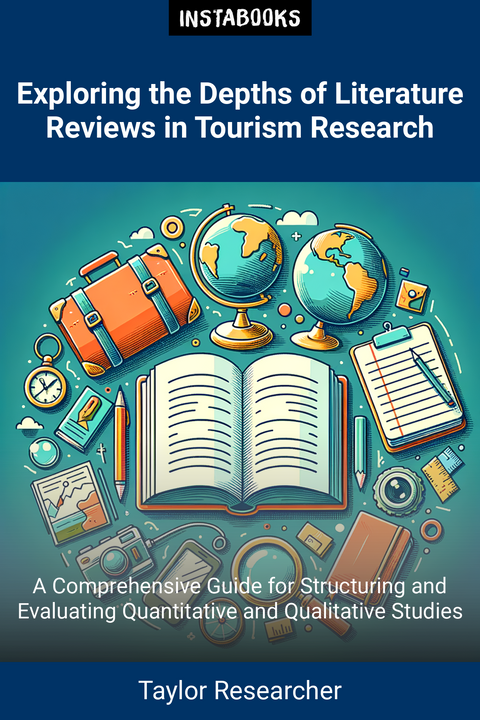
Exploring the Depths of Literature Reviews in Tourism Research
A Comprehensive Guide for Structuring and Evaluating Quantitative and Qualitative Studies
Included:
✓ 200+ Page AI-Generated Book
✓ ePub eBook File — read on Kindle & Apple Books
✓ PDF Print File (Easy Printing)
✓ Word DOCX File (Easy Editing)
✓ Hi-Res Print-Ready Book Cover (No Logo Watermark)
✓ Full Commercial Use Rights — keep 100% of royalties
✓ Publish under your own Author Name
✓ Sell on Amazon KDP, IngramSpark, Lulu, Blurb & Gumroad to millions of readers worldwide
Introduction
In the dynamic and ever-evolving field of tourism research, understanding how to effectively conduct literature reviews is crucial. This book, Exploring the Depths of Literature Reviews in Tourism Research, serves as a practical guide for scholars and practitioners. It delves into the scope, purpose, and relevance of literature reviews, offering insightful perspectives on theoretical and conceptual frameworks.
Understanding Literature Reviews
The importance of literature reviews cannot be overstated. They form the foundation of most academic research, allowing researchers to situate their work within existing scholarship. This book examines how literature reviews help define research problems, identify gaps, and guide future studies, particularly in the context of tourism.
Theoretical and Conceptual Frameworks
Readers will learn about theoretical frameworks, which help in understanding the relationships among existing theories related to tourism. The book also covers conceptual frameworks, emphasizing the need for structured approaches to complex issues, especially when exploring new areas in tourism research.
Structuring Reviews for Quantitative and Qualitative Research
Dedicated sections outline how to write effective literature reviews for both quantitative and qualitative research. Discover the anatomy of academic writing, ethical considerations, and evaluation criteria essential for conducting rigorous research. The book provides detailed guidance on structuring reviews that analyze findings critically, ensuring quality and credibility in tourism studies.
Academic Writing and Ethics
Academic writing is an art that requires clarity and coherence. This book offers extensive tips on formulating research problems, searching literature, and ensuring ethical practices in research. Readers are encouraged to consider ethical implications, such as informed consent and confidentiality, throughout their investigations.
Critical Evaluation
The importance of critical evaluation is emphasized as a cornerstone of conducting literature reviews. Each chapter stresses the need to analyze methodologies, validity, and overall contribution to tourism research. This book is a valuable resource for understanding interdisciplinary efforts and the role they play in shaping tourism studies.
Table of Contents
1. Understanding Literature Reviews in Tourism Research- Defining Literature Reviews
- Purpose and Relevance in Tourism Studies
- Establishing Research Gaps
2. Theoretical Frameworks in Tourism Research
- Overview of Theoretical Frameworks
- Analyzing Existing Theories
- Formulating New Hypotheses
3. Conceptual Frameworks and Their Importance
- Understanding Conceptual Models
- Descriptive vs. Exploratory Research
- Adapting Frameworks in Tourism Research
4. Structuring Literature Reviews
- Essential Components of a Literature Review
- Organizing Research Findings
- Synthesis and Analysis Techniques
5. Quantitative Research: Writing and Ethics
- The Anatomy of Academic Writing
- Conducting Ethical Quantitative Research
- Evaluating Quantitative Studies
6. Qualitative Research: Development and Presentation
- Structuring Qualitative Evidence
- Polishing Qualitative Studies
- Publishing and Disseminating Research
7. Critical Evaluation of Research Studies
- Understanding Evaluation Criteria
- Assessing Methodological Rigor
- Determining Research Contribution
8. Interdisciplinary Approaches in Tourism Research
- The Role of Interdisciplinarity
- Integrating Insights Across Disciplines
- Navigating Publication Trends
9. Effective Academic Writing Techniques
- Clarity and Coherence in Writing
- Common Pitfalls to Avoid
- Enhancing Reader Engagement
10. Ethical Considerations in Research
- Importance of Ethical Practices
- Informed Consent and Confidentiality
- Avoiding Bias in Research
11. Future Directions in Tourism Literature Reviews
- Emerging Trends in Research
- Adapting to Changes in the Field
- Promoting Quality and Rigor in Research
12. Resources for Conducting Literature Reviews
- Recommended Texts and Guides
- Online Databases for Research
- Networking and Collaboration Opportunities
Target Audience
This book is intended for researchers, students, and practitioners in the field of tourism who are looking to enhance their understanding of literature reviews and improve their academic writing skills.
Key Takeaways
- Understand the scope and relevance of literature reviews in tourism research.
- Gain insights into theoretical and conceptual frameworks essential for structuring reviews.
- Learn effective techniques for writing qualitative and quantitative research literature reviews.
- Explore ethical considerations and evaluation criteria for conducting rigorous research.
- Discover interdisciplinary approaches and trends shaping the future of tourism research.
